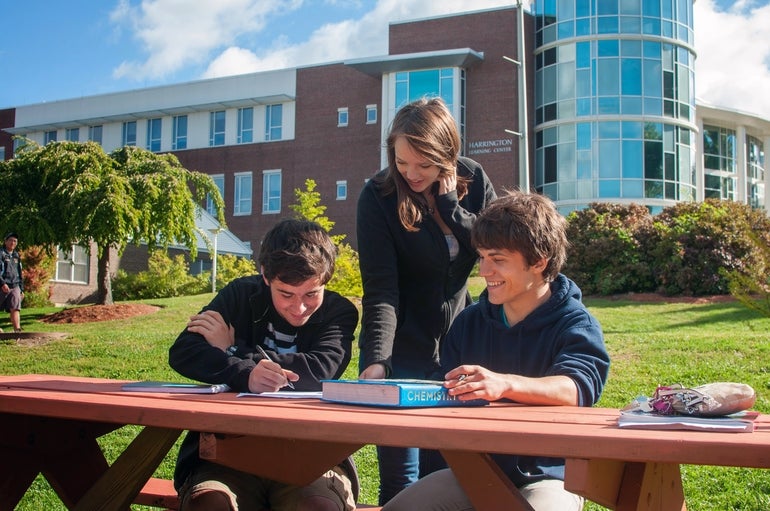By the late 2020s, about half of all high school students could be enrolled in some type of early college, early career or vocational/technical program, which Education Secretary James Peyser said “has the potential really to transform what the high school experience is like” in Massachusetts.
Among those at the forefront of the expansion of early college opportunities is the University of Massachusetts, which is seeking state grant money to support a pilot of its early college program, the Commonwealth Collegiate Academy of the University of Massachusetts. Officials hope to launch the pilot in the fall with the Dartmouth and Lowell campuses spearheading the effort by partnering with local high schools.
UMass President Marty Meehan announced Wednesday that the system received a $330,000 grant from the Richard and Susan Smith Family Foundation for partnership building, training and outreach activity related to the pilot program, and UMass plans to seek a share of $1.3 million in state early college program funding money to cover the costs of having 500 students from the Merrimack Valley and South Coast participate.
Eventually, the Amherst and Boston campuses will be added to the program and UMass officials said they project that full enrollment will grow to roughly 25,000 students statewide.
Katherine Newman, the UMass system chancellor for academic programs and its senior vice president for economic development, detailed the plan for the Commonwealth Collegiate Academy during a Wednesday morning meeting of the UMass Board of Trustees’ Committee on Academic Affairs and Economic Development.
The idea is to give high school students — and particularly those who would be among the first generation of their family to attend college, students from low-income backgrounds, and students of color — a “free one-year head start on earning a college degree,” UMass said.
“The goal is to see early college students complete 30 credits that simultaneously satisfy high school graduation requirements and college credits,” Newman said.
Under the program, students in grades 11 and 12 could take two courses each academic semester and attend an on-campus residential summer program to complete two more courses.
“Our approach will be to deliver live lectures to students in their own high school classrooms during the school day provided by our UMass faculty. Because students in high school need a steady face-to-face presence, we will work in teams with our high school teacher counterparts who will provide discussion sections, laboratories and project support,” Newman said. “This will require constant coordination and true collaboration across institutional boundaries that has really never been tried before, but we believe will be a great opportunity for a stronger bridge.”
She added, “To our knowledge, no other state has attempted to do this at scale as we are trying to do.”
The curriculum will be organized into “intentional pathways” designed to encourage high school students to pursue careers in in-demand fields like STEM, Newman said, and the courses will be “basically identical to the classes we offer on campus.”
Massachusetts Business Alliance for Education Executive Director Ed Lambert said, “The delivery of high-quality content in accelerated career themed pathways is something that the state’s business leaders strongly support. Early College works and scaling up this evidence-based practice can only happen with this type of creativity and partnership.”
There are currently 22 higher education institutions that partner with 42 Massachusetts high schools to serve about 4,500 early college students, UMass said, but more than 80 percent of all Massachusetts high school students do not have access to an approved early college program.
“Massachusetts actually has a very long way to go to catch up with the rest of the country in scaling up early college … we are actually at the bottom of the well in terms of the number of participants,” Newman said.
Early college programs have increasingly grabbed the attention of state officials and business leaders. In February, more than 80 organizations including the Mass. Business Alliance for Education, MassINC, Latinos for Education, State Universities Council of Presidents, Mass. Association of Community Colleges, Mass. Association of School Superintendents and several school districts formed the Massachusetts Alliance for Early College with the goal of boosting enrollment in early college programs from 4,500 to 45,000 in five years.
Gov. Charlie Baker’s $48.5 billion spending plan for fiscal 2023 recommends funding early college programs at $18 million compared to the $11 million allocated this fiscal year. The Baker administration announced Monday that eight more high schools have been designated to offer early college programs and that it expects about 8,700 students to be enrolled in the programs by the 2024-2025 school year.
“Our objective here, as a matter of state policy, is to get 10 to 15 percent of all high school students in early college programs, in addition to another 10 to 15 percent of all high school students in early career pathway programs on top of the 25 percent of students, high school students, who are in vocational/technical programs,” Peyser said during Wednesday’s UMass trustees’ committee meeting. “When you put all of that together, that, in a matter of five to six years or so, could mean that half of all high school students are in one of these sort of structured pathway programs, including some high schools that may have all of their students enrolled in these types of pathways.”
Peyser added, “The implication of that is that it has the potential really to transform what the high school experience is like and that’s got impact way beyond any of the specific or individual partnerships that we’re talking about here; really has tremendous leverage of potential. So having UMass be in the lead of that movement is just really, really important.”

